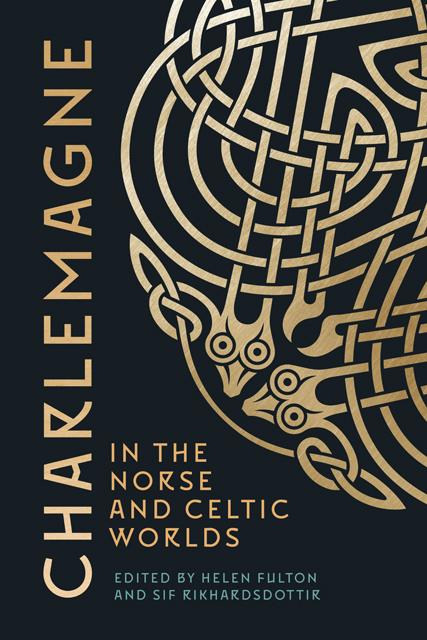Book contents
- Frontmatter
- Contents
- List of Maps and Figures
- List of Contributors
- General Preface: Charlemagne: A European Icon
- Acknowledgements
- Map
- Introduction: Transmission of Charlemagne in Scandinavia, Wales, and Ireland
- Part I The Norse Charlemagne
- Part II The Celtic Charlemagne
- Bibliography
- Index
- Bristol Studies in Medieval Cultures
2 - The Cultural and Ideological Function of Charlemagne
Published online by Cambridge University Press: 08 June 2023
- Frontmatter
- Contents
- List of Maps and Figures
- List of Contributors
- General Preface: Charlemagne: A European Icon
- Acknowledgements
- Map
- Introduction: Transmission of Charlemagne in Scandinavia, Wales, and Ireland
- Part I The Norse Charlemagne
- Part II The Celtic Charlemagne
- Bibliography
- Index
- Bristol Studies in Medieval Cultures
Summary
The stories about Charlemagne and his political and military achievements that circulated widely in medieval Europe, both in Latin and in the various vernaculars, found a fertile ground in the territories of Northern Europe. Stories featuring the Frankish king as the main protagonist are indeed known from all areas of the medieval North. The diffusion of the matière de France in the Nordic countries is held to have begun at the court of Hákon IV Hákonarson (r. 1217–1263), around the middle of the thirteenth century, and from there it subsequently branched out into the other territories (Iceland, Sweden, Denmark, and the Faroe Islands). This process presumably stretched over a long period of time if one considers that Icelandic copies of the Old Norwegian Karlamagnús saga are known to have been made as late as the seventeenth century.
A decisive contribution to the initial spreading of such narratives in Scandinavia was no doubt made by translations (as seen above in chapter 1). Indeed, in addition to Karlamagnús saga – itself a compilation of translated texts about Charlemagne, mostly based on Old French chansons de geste mediated through Anglo-Norman – both the Old Swedish Karl Magnus and the Old Danish Karl Magnus Krønike can surely be considered to be translated texts. The present chapter focuses on these three works and aims to analyse the cultural and ideological function that Charlemagne had in medieval Scandinavia through the transmission of the matière de France.
The fact that the three texts that will be analysed in the following sections are translations is relevant to the aim of the present chapter. Scholarship in the field of medieval literatures has over the last twenty years made clear that the notion of translation in the Middle Ages allowed various forms of reshaping and rewriting of the source text according to the norms that were dominant in the target culture. If translation can be defined, on a general note, as a negotiation involving two cultures rather than merely two languages, it may quite often be described as a manipulation, whereby both the wording and the meaning of the source text may undergo such major changes that the final result could be defined as an outright rewrite. What drives the manipulative process of the amendments of the source text is generally to be found in the target system.
- Type
- Chapter
- Information
- Charlemagne in the Norse and Celtic Worlds , pp. 31 - 49Publisher: Boydell & BrewerPrint publication year: 2022



